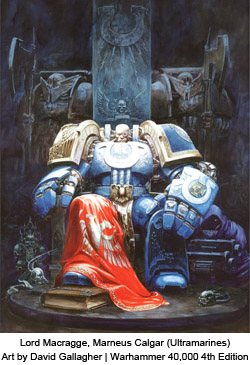It is the 41st Millennium. For more than a hundred centuries the Emperor has sat immobile on the Golden Throne of Earth. He is the master of mankind by the will of the gods, and master of a million worlds by the might of his inexhaustible armies. He is a rotting carcass writhing invisibly with power from the Dark Age of Technology. He is the Carrion Lord of the Imperium for whom a thousand souls are sacrificed every day, so that he may never truly die.
Yet even in his deathless state, the Emperor continues his eternal vigilance. Mighty battlefleets cross the daemon-infested miasma of the warp, the only route between distant stars, their way lit by the Astronomican, the psychic manifestation of the Emperor’s will. Vast armies give battle in his name on uncounted worlds.
Greatest amongst his soldiers are the Adeptus Astartes, the Space Marines, bio-engineered super-warriors. 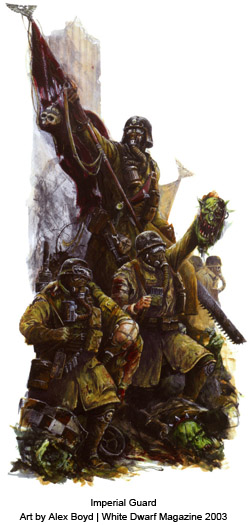 Their comrades in arms are legion: the Imperial Guard and countless planetary defense forces, the ever vigilant Inquisition and the tech-priests of the Adeptus Mechanicus to name only a few. But for all their multitudes, they are barely enough to hold off the ever-present threat from aliens, heretics, mutants—and worse.
Their comrades in arms are legion: the Imperial Guard and countless planetary defense forces, the ever vigilant Inquisition and the tech-priests of the Adeptus Mechanicus to name only a few. But for all their multitudes, they are barely enough to hold off the ever-present threat from aliens, heretics, mutants—and worse.
To be a man in such times is to be one amongst untold billions. It is to live in the cruelest and most bloody regime imaginable. These are the tales of those times. Forget the power of technology and science, for so much has been forgotten, never to be re-learned. Forget the promise of progress and understanding, for in the grim dark future there is only war. There is no peace amongst the stars, only an eternity of carnage and slaughter, and the laughter of thirsting gods.
Welcome to the dark world of Warhammer 40,000, the mother of all dystopian tabletop game settings. An earlier version of the passage above first appeared as an introduction to the 1987 miniatures battle rulebook Warhammer 40,000: Rogue Trader written by game designer Rick Priestly and published by Games Workshop. In the nearly 25 years since its first publication this passage has grown to keep pace with the ever expanding reach of the 40K universe. Each year new threats to the Imperium of Man are revealed while scribes work tirelessly to document the glory of the Emperor. In this time Games Workshop has also grown the franchise into its own vast empire, some would say with the ruthlessness of the Emperor himself.[*] Warhammer 40,000 is no longer simply a tabletop miniatures game, it is a hobby unto itself and has expanded to other media such as roleplaying games, boxed tabletop games, video games, a vast library of licensed books, and even a direct-to-DVD movie.
Games set within the 40K universe are constantly going in and out of print, it would be impossible to cover the full range and history of this series in the time and space available. Those interested in more detail are referred to the Warhammer 40K Wiki and Games Workshop’s own site. What follows is a brief overview of some of the more significant games currently in print and one indulgence in covering a game recently out of print but possibly not forever.
Warhammer 40,000 Tabletop Battle Game
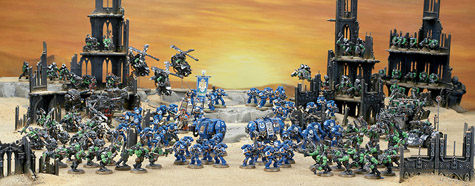
Choose your army and wage never ending war within cathedral ruins, on blighted city streets or bomb blasted plains. The 28mm tabletop miniatures battle game is foundation of the entire 40K line. Players purchase, assemble, and paint armies selected from a vast catalog of combatants. Typically players will specialize and collect armies of a specific race and/or faction and will battle against other players that have collected opposing forces. Each model or group of models has special capabilities, an elaborate history, and are assigned a point value depending upon their strength. Each player will select models from his or her own collection matching a previously agreed upon point value. The battle is then fought on a table space approximately 4 feet square or larger, often decorated with elaborate set pieces and terrain.
 Warhammer 40K is as much a lifestyle as it is a game. Players are typically intimately familiar with the back story of their armies and the mythology of the 40K universe. There is a collection aspect to the hobby with players rightfully proud of armies they have assembled. Painting and modeling skills are also on display incorporating a craft element that would be difficult to underestimate.
Warhammer 40K is as much a lifestyle as it is a game. Players are typically intimately familiar with the back story of their armies and the mythology of the 40K universe. There is a collection aspect to the hobby with players rightfully proud of armies they have assembled. Painting and modeling skills are also on display incorporating a craft element that would be difficult to underestimate.

There are two ways to get started in the miniatures battle game. Games Workshop sells a starter set, Warhammer 40,000: Assault on Black Reach, which contains everything necessary for two players to stage basic battles. It includes a pocket-sized rulebook, miniatures for two small armies (Space Marines vs. Orks), cardboard scenery, and miscellaneous game accessories. Aspiring players may also get started by purchasing the full hardbound rulebook and an army of figures separately. The full rulebook and the starter set rulebook are identical with respect to describing game mechanics; however, the full rulebook offers an additional 300 pages of back story, painting tips, and other hobby information. While the starter set may seem tempting, Warhammer 40K is primarily a community experience. Buying the rulebook and armies separately allows a new player to join established players more easily, 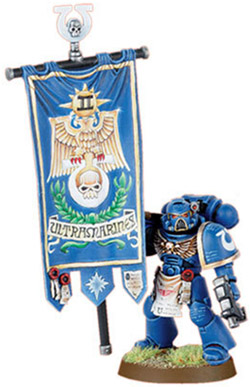 purchasing complementary armies without unnecessary duplication.
purchasing complementary armies without unnecessary duplication.
While it’s entirely possible to order Warhammer 40,000 products online, Games Workshop favors supporting local retailers as its primary distribution channel. Many local retailers offer in-store gaming, a variety of terrain pieces for in-store use, and most importantly a community of players ready to help new comers. Use of GW’s store locator is strongly encouraged. The 5th edition starter set and full rulebook may also be purchased directly from Games Workshop’s website for $90.00 and $57.75 respectively.

Step back to the 31st millennium and recreate the cataclysmic event that hurtled the Imperium into a gruesome civil war. Horus Heresy is a board game for two players in which the traitor Warmaster Horus leads a force of Chaos Space Marines in an assault against the Emperor, his palace, and his loyalist troops on Terra.
Horus Heresy was designed by John Goddenough and Jeff Tidball and published by Fantasy Flight Games in 2010 under license to Games Workshop. It’s important not to confuse Horus Heresy with a reimplementation of the miniatures battle game. Horus Heresy has a lot of cool 3 dimension components including miniatures for the combatants and terrain for the board, however, this is very much a self-contained boardgame set in the 40K universe. It is also a complex game with players making strategic choices about when and where to allocate troops and requires players to pay close attention to the innovative initiative system or risk devastating losses. Non-gamers may want to think of this game as a very advanced form of Risk (and gamers familiar with this style of game will cringe at the comparison). Horus Heresy will appeal primarily to cross-over gamers that enjoy complex boardgames and either play the 40K miniatures game or are interested in the setting. Horus Heresy may be purchased at full service game stores and online for about $60-$90.
Space Hulk: Death Angel – The Card Game
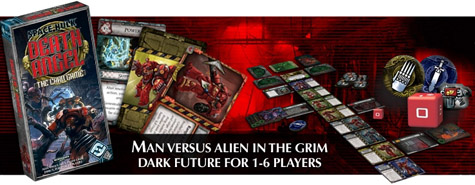
Command a combat team of Space Marines and join a Blood Angel assault squad as they fight deck by deck through a derelict space hulk attempting to eradicate the Genestealer infestation. Space Hulk: Death Angel – The Card Game is a cooperative game for 1 to 6 players designed by Corey Konieczka for Fantasy Flight Games that miraculously distills much of the brutal full-sized Space Hulk game into a challenging, compact, fast playing, 30 minute game.
Yes, I know, this was on my stocking stuffer list for games under $20 and it’s still the best bargain in the 40K universe. New since November: Fantasy Flight Games has released two print-on-demand mini-expansion decks for $4.95 each. Mission Pack 1 offers some new terrain, ship location cards, and a new threat; Adrenal Genestealers. Space Marines Pack 1 offers two new combat teams featuring Brother Adron with his Cyclone Missile Launcher. Neither is essential but they’re nice for variety if you’re enjoying the game.
Space Hulk

Sadly, the full-sized, 3D game upon which Space Hulk: Death Angel – The Card Game is based is not currently in print. Games Workshop published the third edition of Space Hulk in 2009 after a 13 year hiatus. Even with a $100 price tag, online retailers presold their stock weeks before the game’s official release, brick and mortar stores sold out only a month or two later. You can still find copies of Space Hulk for sale on eBay but expect to pay about $150 or more for a gently used copy, over $200 for a copy still in shrink wrap.
Why all the fuss? Of all the miniatures based versions of Warhammer 40K, Space Hulk was arguably the most accessible. It was a complete game in a box featuring cool miniatures, spaceship terrain and floor tiles, and streamlined rules that were easy to teach and moved the game along quickly. There isn’t a shred of rumor with regard to a reprint, and I don’t want to start one here, but I can’t imagine that Games Workshop or Fantasy Flight Games will allow this niche’ to remain unfulfilled for long.
Roleplaying in the Warhammer 40,000 Universe

Roleplaying games aren’t really my specialty; there are other bloggers on this site far more qualified than I for commentary in this area, however, with the richness of the 40K universe this article would be incomplete without at least mentioning some of the extensive roleplaying offerings available from Fantasy Flight Games.
Fantasy Flight Games currently publishes four standalone core rulebooks, each focusing on a different aspect of adventuring in the Imperium. In Dark Heresy players hold the forces of Chaos at bay and serve as an Acolyte in the Emperor’s Inquisition, being every vigilant in their secret war against heresy. In Rogue Trader players take the roles of privateering merchant princes seeking profit and plunder in uncharted regions of the void. Deathwatch allows players to join the fabled ranks of Space Marines. In Black Crusade players can walk on the dark(er) side and unite with the forces of Chaos and strike terror against the worlds of the Imperium.
Collectively these rulebooks are known as the Warhammer 40,000 Roleplay System. While the rulebooks share many of the same game mechanics, the relative strengths of characters between game systems are not necessarily evenly matched, consequently, each product line has its own range of supplements including source books and adventure packages.
Specialist Games

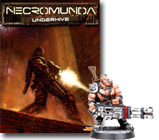 Games Workshop publishes a number of games lumped under the general heading of specialist games. Each of these games is a tabletop miniatures battle game but they look at the 40K universe in a variety of scales (referring both to the conflict and the miniatures involved). These games are considered in print; however, with the possible exception of Necromunda, they are fairly rare and not as popular as the games listed above. Before getting deeply invested into one of these titles I would strongly recommend researching the availability of components and potential opponents.
Games Workshop publishes a number of games lumped under the general heading of specialist games. Each of these games is a tabletop miniatures battle game but they look at the 40K universe in a variety of scales (referring both to the conflict and the miniatures involved). These games are considered in print; however, with the possible exception of Necromunda, they are fairly rare and not as popular as the games listed above. Before getting deeply invested into one of these titles I would strongly recommend researching the availability of components and potential opponents.
Battlefleet Gothic simulates combat between mighty spaceships of the 41st Millennium. The starter set is no longer available but a revised core rulebook and ships are still being produced. The rules can be downloaded for free as a series of PDF’s, a hardbound version is available from GW for $41.25. Miniatures can be purchased from local game stores or directly from GW. The Battlefleet Gothic miniatures may also be used with the new Battlefleet Kronous supplement published by Fantasy Flight Games. Battlefleet Kronous introduces advanced spaceship combat to the Rogue Trader roleplay setting.
Epic Armageddon features large scale combat between giant armies, often numbering in the hundreds of units. To make such battles practical, Epic Armageddon miniatures are very small in scale (6mm), often grouped five to a base. This scale also allows the use of giant war machines and aircraft which are difficult to include in the standard 28mm scale. The rules can be downloaded for free as a series of PDF’s, a hardbound version is available from GW for $41.25. Miniatures can be purchased from local game stores or directly from GW.
Inquisitor is an odd mix of role-playing and man-to-man combat using large 54mm miniatures. This scale was intended to feature highly detailed models but in practice only a limited variety of figures were produced. See the offerings by Fantasy Flight Games above for a more modern take on roleplaying in the 40K universe. The rules for Inquisitor can be downloaded for free as a series of PDF’s, a hardbound version is available from GW for $45.00. Miniatures can be purchased from local game stores or directly from GW.
Necromunda is probably the most popular of the specialist games and the one you’re most likely to see being played at your local hobby store. Necromunda features gang fighting in the Underhive, ruined caverns beneath the towering city of Necromunda. A key feature of Necromunda is its narrative story arcs. Players choose gangs of roughly six figures each and engage in a linked series of battles which collectively form a campaign. Winning battles rewards gangs with experience and wealth which may be used to purchase upgraded weaponry and gear. The outcome of each battle influences the course of the campaign which can unfold in a story like fashion. The rules can be downloaded for free as a series of PDF’s, a hardbound version is available from GW for $41.25. Miniatures can be purchased from local game stores or directly from GW.
[*]Starting in late 2009 Games Workshop began an aggressive legal campaign to protect its intellectual property. This action included sending numerous cease and desist orders requiring fans to remove GW art from websites and extended to a variety of original fan created game accessories and content. It is not my intention to debate the merits of GW’s actions in this space, I simply wish to provide a little background to explain why fans of the game may be legion but fans of the company are not.
When not playing games, Bob Gallo is a computer programmer specializing in Flash and interactive application design living in the Charlotte, NC area. Bob got his gaming start in the mid 1970s with traditional hex-and-counter war games and has played nearly all types of games including role playing games, miniatures, collectible card games, video/PC games as well as traditional board and card games.










